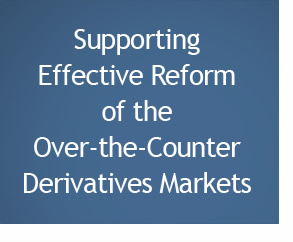10/27/11 - Bloomberg - By Phil Mattingly and Bob Ivry
|
|
Bank of America Derivatives Transfer Attracts Lawmaker Scrutiny
U.S. House Democrats are pressing regulators on whether they explored possible risks connected to Bank of America Corp.’s moving of derivatives from Merrill Lynch into its deposit-taking unit after a credit downgrade.
Lawmakers including Representative Brad Miller want to know whether agencies consulted on the transfer considered the potential impact on the bank’s health as well as the risk posed to customer deposits, according to a letter the North Carolina Democrat sent today to Treasury Secretary Timothy F. Geithner and other members of the Financial Stability Oversight Council.
“Because of the favored treatment of derivative contracts in receivership, it appears highly likely that losses on derivatives would result in losses to insured deposits ultimately borne by taxpayers,” Miller wrote. The transfers were first reported by Bloomberg News on Oct. 18.
House Democrats, many of whom sought Dodd-Frank Act amendments to wall off banks’ customer deposits from risky businesses such as derivatives trading, are pressuring the council of regulators for information over their role and oversight of the transaction. Bank of America doesn’t believe regulatory approval was needed to make the transfer, said people with knowledge of the bank’s position said last week.
Bank of America, based in Charlotte, North Carolina, transferred the derivatives after a September downgrade by Moody’s spurred some partners of the bank’s Merrill Lynch brokerage unit to ask that contracts be moved to the higher- rated retail bank, according to people familiar with the transactions.
Federal Reserve Act
Moving derivatives contracts between units of a bank holding company is restricted under Section 23A of the Federal Reserve Act, which is designed to keep lenders’ affiliates from benefiting from federal subsidies and protect banks from excessive risk originating at non-bank affiliates.
“We had worked very hard over the course of the last nine months to be prepared to the extent that we did receive a downgrade, and feel very good about the way that we’ve minimized the potential impact,” Bank of America Chief Financial Officer Bruce Thompson said on an Oct. 18 conference call with analysts.
Miller’s letter asks regulators about the quality of the transferred portfolio, as well as a price for the derivatives book if it was considered by the Fed to be an asset purchase. It also asks whether Bank of America made proprietary risk models available to regulators and whether there was exposure in the book to Europe’s sovereign debt crisis.
Stronger Rules
Separating complex transactions from Federal Deposit Insurance Corp.-insured savings has been a cornerstone of U.S. regulation for decades, including Dodd-Frank, the regulatory overhaul enacted last year. Bank of America’s transfer has prompted some lawmakers to push for stronger rules than were included in that sweeping law.
Senator Bernie Sanders, a Vermont Independent who supported legislation to separate trading operations from commercial banking, said the transaction is a “perfect example why we should break up too-big-to-fail financial behemoths.”
“If federal regulators give the green light to Bank of America to move its risky derivative schemes it acquired from Merrill Lynch into its federally insured commercial banking subsidiary that would be outrageous,” Sanders said.
Representative Maurice Hinchey, a New York Democrat who pushed to require splitting commercial and investment banking, said Bank of America’s actions underline a lost opportunity.
“What Bank of America is doing is perfectly legal -- and that’s the problem,” he said. Hinchey is among more than 40 House lawmakers who have signed on to the bill that would reinstate the Glass-Steagall Act, the Depression-era law that enforced separation of depository institutions from investment operations before it was partially repealed in 1999.
“The FDIC is in effect being forced to insure Wall Street’s risk-taking,” Hinchey said in a statement. “This is the opposite of capitalism -- the risks are socialized and the benefits are privatized.”
Senators John McCain, an Arizona Republican, and Maria Cantwell, a Washington Democrat, lobbied last year for a Senate floor vote to reinstate Glass-Steagall. The amendment never got a vote.
|



